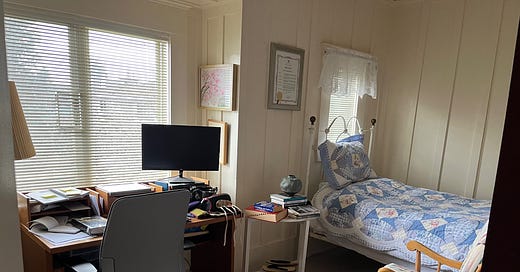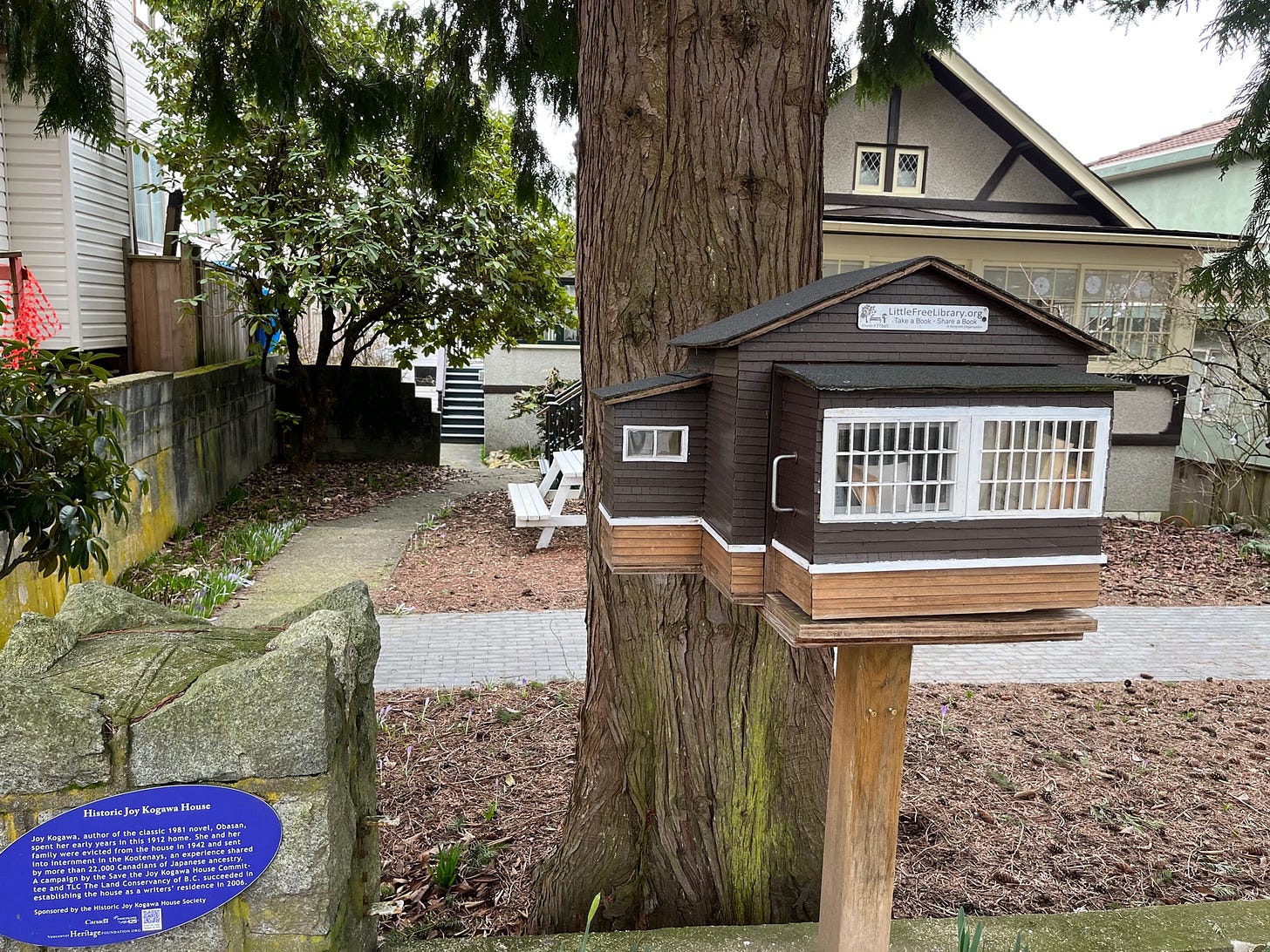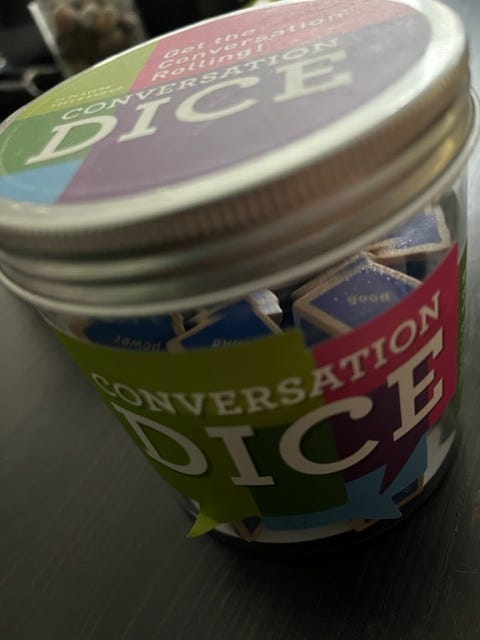The “writing space” in the Joy Kogawa House, Vancouver, BC. (Joy Kogawa’s childhood room.)
Gail Nyoka, recent Writer-in-Residence at Kogawa House, has been living and working in this historical and inspiring space for the past two months. It was a treat to be shown around.
Last month, I asked you to please share your work space photos. (And please do! Email to alison@alisonacheson.com) Just days after that, I met up with Gail for lunch after years of not seeing each other, and asked to take photos. So good to talk shop and family.
I first met Gail after her children’s novel, Mella and the N'anga: An African Tale, was published—such a vivid and memorable story! Gail writes novels, plays, and is a story-teller. (And has agreed to do a Q&A with us about story-telling in a few months!)
The Kogawa House is filled with lovely writing spaces, and outside, has the perfect ‘garden library,’ a model of the bigger house:
In the front room, is a display that shares the history of the Kogawa home. Presiding at the table is a life-size photo of author Joy Kogawa.
And Gail with…
Thank you, Gail, for sharing the house, and this photo!
Web: https://gailnyoka-stories.com
Facebook: https://www.facebook.com/pages/Gail-Nyoka
Twitter: http://twitter.com/#!/StorytellingWan
~~~
This month’s Q&A, featuring Cara DiGirolamo
Our areas of study, as undergrads, grads, or independent students of the world do shape us. My own history degree has served as a life paradigm for my thinking. We don’t really think about this—do we?—when we decide our “majors.”
I would love to hear about this in the comments—words about your backgrounds/ interests/readings/travels/occupations/formal and informal studies—how this shapes you as a writer.
I’ve asked Cara DiGirolamo, speculative fiction writer and former teaching assistant at UBC, to please do a Q&A for the Unschool. As she entered the MFA program, she already had in hand her PhD in Linguistics. In class, often, she would come up with such delicious tidbits of language! I had to ask her to share here.
As writers, we are all invested in language—one of our most basic tools, some would argue, THE most.
Alison: What drew you to the study of linguistics? Did you know before or after that, that you wanted to write stories?
Cara: I came to linguistics pretty late. In college I was a Comparative Literature Major, focusing on Japanese and Classical Japanese. But I was also pretty skeptical, and when I was in my Comparative Literature seminar for majors, we kept discussing these grand theories of translation, and I just wasn’t sure I believed them. Where was their proof that language worked like that? I wanted more than anecdotal evidence.
After college, I sat in on a Pragmatics class because I thought it would teach me more about Speech Act theory—something I'd studied in Comparative Literature and liked a lot. But instead it showed me that there was a whole field of science and philosophy of language that I had never even imagined existed. And it was pretty wild too. As a speculative fiction writer, anything called “the theory of possible worlds” had my attention.
Alison: How do you use this knowledge… and how do you use it in different points of the process—before, during, or after a first draft / mid / and / or final draft.. (Please feel free to play with any of these questions as you want :) You do NOT need to address each possible point—just as it applies to your process, and what you want to share.
Cara: Linguistics comes in handy all the time while writing. When I’m planning a project—say, world building for a fantasy world—knowing phonology can help me name characters in a way that feels consistent. In the middle of writing, I might use my knowledge of sociolinguistics to make sure that no one’s addressing a prince in a too familiar way, or make my characters’ voices distinct. And in editing, I use my syntax background to flex and manipulate sentences until they say exactly what I mean in the clearest way possible.
Alison: Can you share one or two times when this knowledge has really broken through a block or turned something on its head, or… ?
Cara: I’ve always known that famous fantasy writers—cough Tolkien cough—liked to make up their own languages, but that never worked for me. I always felt deeply unimaginative when I was trying to make up a language, and my languages all sounded completely fake. But when studying Old Irish, I realized how much an orthography needs to be adapted to fit a new language, and how some of them just don't fit right. (This is why Sean = Shawn). Then it just came to me that one of the cultures in my novel had to have a language that used to be written in an Arabic-style abjad, but because of a different dominant culture moving in, now it’s spelled alphabetically, but the new dominant culture’s writing system doesn’t have the right letters.
Knowing that the language was written in the wrong letters broke the world building wide open for me, and I suddenly knew so much about the relationship between the cultures, and how people felt about these different languages, and where they’d speak one or the other. I didn’t need to make up the whole language, because I knew the important thing: where the socio-political tension was regarding their speech.
Alison: How would you respond to someone who is wondering what area of study might be most beneficial to becoming a writer?
Cara: I believe one thing about this, and that’s that everything you know will help with writing, so the more you know the better. Study anything and everything, and most of all, practice explaining it to people outside the field. If you do that, you’ll be a good writer—from all the explaining—and you’ll never run out of things to write.
—Thank you to Cara, for sharing with us here. LOVE the note about explaining, and the connection to writing.
~~~
A HUGE thank you to those who acknowledge the hours that go into creating the Unschool. I am so grateful we can be without ads here, too.
~~~
PROMPT
This month’s prompt will be posted shortly in its own thread as usual.
Please note: Don’t share each others’ work. It’s for Unschool eyes only, for online workshopping purposes, sharing and feedback. And as a result, it does not count as “published” for the purposes of you being able to submit to markets and contests.
For story-starters (or poetry, or nonfiction pieces, too) we’ll start with a few of these —
Peace, and Happy writing—
Alison









Thank you so much for the interview with Cara! She helped me appreciate my writing and encouraged me to keep writing. I miss her so much:) You (Alison and Cara) are the best CRWR Professor and TA anyone could ever ask for. I wish I could go back to the CRWR 303 class...
Also, I can't agree more with how knowing more (about anything) always helps to become a better writer. In my case, learning the basics of anthropology helped me develop so many imaginative plots that I would never have been able to come up with otherwise!